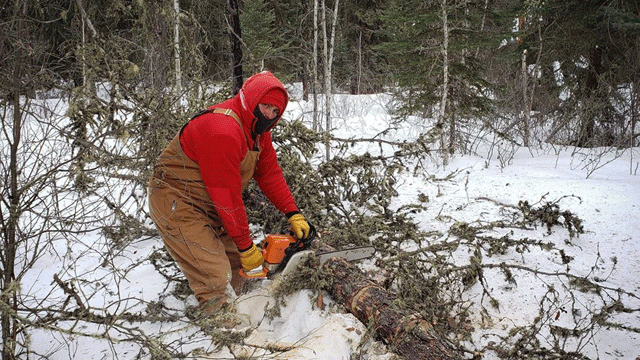
APTN News
Twenty-four communities in the remote, primarily-Indigenous northwestern region of Saskatchewan banded together earlier this month to present a unified front in the fight against Covid-19, which leaders say could be an emergency preparedness model for other regions as well as future generations.
First Nations, Metis and municipal leaders established the regional Incident Command Centre (ICC) in early April to coordinate pandemic planning, maximize limited resources and fill in gaps left by the provincial emergency response.
They were assisted soon after by the mobilization of the 4th Canadian Ranger group, military reservists who reside permanently in the region.
Those running the centre realized the virus doesn’t observe jurisdictional boundaries, so neither should the response.
“We’re a provincial north. We’re a circumpolar community,” said Incident Commander Rick Laliberte.
“We’re a community in and of itself and that’s what we’re realizing – that all the delineation between jurisdictions has not been caused by us. This is like a wake up for us. It’s an awakening of our relationships. Nobody’s going to take care of us unless we take care of ourselves.”
Laliberte is Metis and until 2004 served as MP for Desnethé—Missinippi—Churchill River, the electoral district that covers the province’s northern region.
Speaking to APTN News from the command centre in Beauval, he explained that local First Nations leaders were pulling their pandemic plans off the shelves but Metis and municipal communities under provincial jurisdiction had “no such plan.”
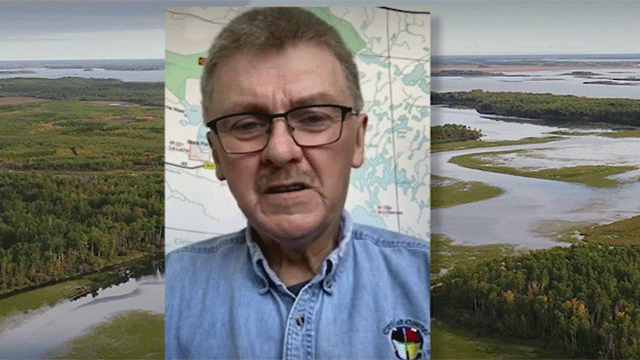
(Incident Commander Rick Laliberte in a video update for local communities. Photo: Northwest Communities Incident Command Centre)
Leaders soon invited him to head the regional response.
“We found there was a big gap because the province’s pandemic plan only extended to the health care centres. The communities’ preparedness was not in the province’s focus. But we learned from the First Nations side the community has an important role in addressing the pandemic threat,” Laliberte said.
Now they hold daily teleconferences for all communities. Traditional land users are harvesting moose and fish and Laliberte said he’s working with the Metis Nation in Saskatchewan to extend commercial fishing operations. There is a colour code system in communities so those delivering essential services know which houses to use extra caution around. Messages are getting out in Cree, Dene and Michif. The team threw together and launched a website for community members to access critical information.
The centre encourages individual households to plan for Covid-19: separating the sick from the well, isolating in the bedroom, disinfecting vector points such as toilets after every use and following Word Health Organization (WHO) guidelines for containment of infectious disease.
“Empowering our households and our people in the north” is a “concerted effort” by the residents themselves, Laliberte said, after the province’s emergency response failed to adequately emphasize community containment.
“We’re just doing it ourselves. It’s the way to do it and we’re encouraging other areas to do it.”
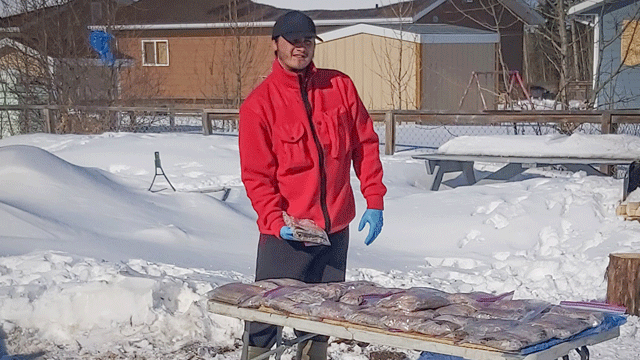
(Master Cpl. Jeremy Daigneault prepares freshly caught fish to be delivered to community members in Île-à-la-Crosse, Sask. Photo: Sgt. Tanya Aramenko/Facebook)
Running on a shoestring budget
Seventy per cent of the region’s population is Indigenous – mainly First Nations with some Metis – according to the 2016 census. The southernmost of the 24 communities, Green Lake, is still 300 kilometres north of Saskatoon by road.
Laliberte said they’re maximizing local resources and receiving donations but still waiting for help from the province.
“We’ve set up these measures for the first month here, and we’ve run out of resources because we’re just running on our own local resources, and we’ve asked for the provincial emergency measures to kick in – they haven’t responded.”
The entire region is served by one ventilator and testing is minimal, he said. They’re requesting personal protective equipment (PPE) as well as specific restrictions on alcohol and non-essential travel as eager non-resident hunters and fishers prepare for outfitting season. The plan, should an outbreak happen, is for the province to move patients to a field hospital in Saskatoon or North Battleford.
“Nobody is hearing our sense of urgency, and this time we’re just doing it alone. So whatever we can do as a community, whatever we can do to secure the safety our people, we’re just doing it for the sake of public safety and to save lives.”
APTN brought these concerns to the Saskatchewan government’s First Nations and Metis Relations Unit, who referred the question to the health department. We did not receive a response by publishing time.
The region has avoided an outbreak so far. The Cree community of Southend was able to isolate and contain its two cases: a nurse who travelled internationally and the taxi driver who drove her home from the airport. A nurse brought one case to Stony Rapids, one of the region’s northernmost communities located about 1,000 kilometres north of Saskatoon. Another case was confirmed La Loche, which Laliberte said was associated with a March 14 ski doo rally.
An estimated 259 Covid-19 tests had been completed among First Nations people living in or near First Nations communities in Saskatchewan as of April 14, according to the Federation of Sovereign Indigenous Nations (FSIN).
There were 305 confirmed Covid-19 cases and 4 deaths in the province as of this posting.
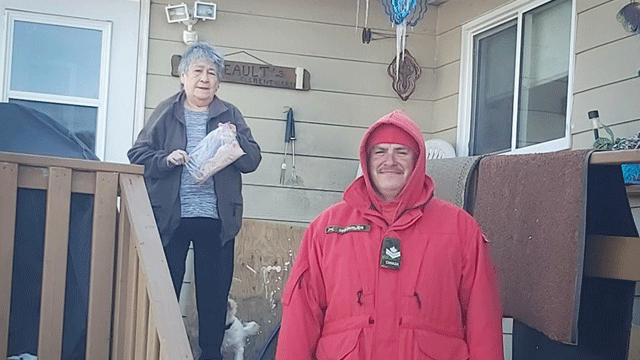
(Master Cpl. Clayton Desjarlais delivers fish to an Elder in Île-à-la-Crosse, Sask. Photo: Sgt. Tanya Aramenko/Facebook)
Read more:
How two First Nation communities with positive cases are fighting COVID-19
Saskatchewan First Nation has presumptive case of COVID-19
While the Rangers are reserve members of the Canadian Armed Forces, they live and work in the remote communities they serve. Each Ranger who is able to work is being offered full status as a member of Canada’s military. The offer is open until the end of August. The 4th Canadian Ranger group mobilized two patrols on April 11 and one more on April 15.
Their primary task is to help the community mitigate the spread of the novel coronavirus. They’ve been setting up an emergency response centre, distributing fresh fish, delivering care packages for those isolating, conducting community wellness checks and supporting Elders.
Sgt. Jean Tsannie, commander for the Wollaston Lake patrol group, spent the morning gathering firewood for Hatchet Lake Denesuline First Nation members, a remote community in the far northeastern corner of the province.
She’s lived in the community her entire life.
“I grew up off the land. My late dad was a commercial fisher and he was also a trapper,” she said of why she became a Ranger.
“Living off the land is what I love doing. I’ve been a Ranger for probably about 10 years and I just want to help my community as much as I can. I’m the type of person that is willing to help all the time”
Tsannie told APTN the community has pulled to together to support one another.
“Three days ago, recently, a community member got together with the RCMP. The lights were on, the blinkers were on, and they were going around town honking saying thank you to the front-line workers.”
“You want to give back more” with that kind of encouragement, she added.
Rangers are also active in Nunavik in sub-arctic Quebec and are expected to mobilize in Quebec’s Lower North Shore region as well as northern Ontario.
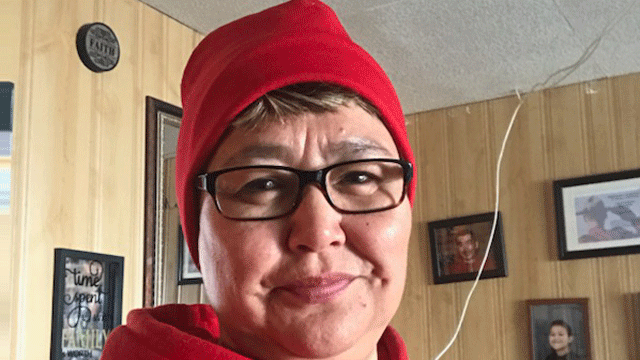
(Sgt. Jean Tsannie. Supplied photo)
‘The notion of self-reliance from our people is emerging’
Others see broader significance of the increased co-operation, which also includes non-Indigenous communities.
Dr. Alexandra King hails from the Nipissing First Nation in Ontario but now occupies the Cameco chair in Indigenous health and wellness at the University of Saskatchewan.
“Some of the innovations that are going on right now as a consequence or in response to Covid are really also important to highlight,” she said.
King suggested there is decolonizing potential in the present pandemic conditions as communities increase regional unity and shore up traditional food sovereignty.
“There is concern about the fragile drug supply that exists, and again communities are banding together to try and anticipate and come up with solutions for this,” she said.
“I have heard of different communities that are increasing the hunting that is going on, the fishing. They are trying to create greater reserves of food that is available to their communities. They’re looking at garden projects and how to expand that this summer.”
Napoleon “Nap” Gardiner, another person working at the command centre, expressed a similar sentiment.
“This is just another example of how the notion of self-reliance from our people is emerging. It’s that every time something like this happens we see much more clearly the deficits and the lack of response and negligence by central governments to regions such as us,” said Gardiner, CEO of Northwest Communities Management Company.
“The whole notion of the Indigenous psyche and what it is to be a person or human is that interconnectedness and that inclusion and that fullness of life – that you don’t see just the whole aspect of planning for an event that potentially might happen, but it’s the whole aspect that, ideally in our communities, we’re always prepared for everything.”
While King called some of these responses “innovations,” Laliberte noted they’re also a return to tradition.
“Traditionally, that’s how it’s been for our families. We’ve never been separated. The governments have separated us from First Nations, from Metis communities. Our relations were interrelated. Our families are interrelated. In times of crisis, we are going to work together. That’s what’s happening over here.”










